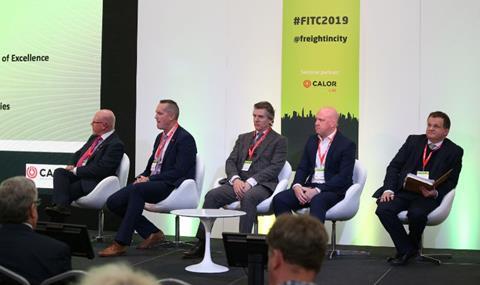
Panellists at this year’s Freight in the City Expo have agreed that electric is likely to be the dominant fuel of the future for hauliers but admitted there is “no magic silver bullet” and that the sector will ultimately choose a “blended solution” using a mix of technologies based on the specific requirements of their fleets.
Another emerging trend will be the sharing of charging facilities amid increased cooperation among hauliers, one predicted.
The event, held at London’s Alexandra Palace on 6 November, saw leading vehicle manufacturers, the RHA and prominent fleet operators discuss the potential and challenges of embracing new fleet technology.
Asked for his view on the likely fuel of the future for hauliers, Graham Neagus, Head of LCV, Renault Trucks said: “Going electric is the way forward and should almost leapfrog other alternative fuels which are tinkering around the edges. Electric goes straight to zero and gives everyone a head start.”
The other benefit of electric, he said, is that it is the most easily adaptable fuel and that gas presented a “much more challenging infrastructure”.
“We’re in a fortunate position in that we have 16-tonne electric vehicles that you can already purchase where you can get into Milton Keynes from London and back on a single charge,” he said. “Things are moving at a good rate.
“But the future will be about a blended solution. The fleet of tomorrow, and of today, will be a mix of technologies. But from a zero emission goal, electric does seem to be the way to go. The easiest way to overcome your carbon footprint is to put a percentage of your vehicles into electric where that application suits.”
Check out the show highlights from Freight in the City 2019 in this video.
Neagus predicted that urban charging points and related facilities would be shared amid a new mood of sector “cooperation”.
“I also think there are a number of areas highly suitable for electric HGV charging that are as yet untapped,” he added. “Look at the football and rugby stadiums in London. They have vast car parks that are typically empty. The stadiums need plenty of electricity to power them. Why can’t they work with the transport and logistics sectors? They’re off road and it could be another income stream for them.”
Asked by the event’s host, BBC journalist Declan Curry, if companies were wasting time “pussy footing around with other fuels”, Neagus said two things were currently “holding electric back”.
“One is battery technology and other is the ability to work with the energy supply companies. For us, this is very much a consultative relationship between the infrastructure providers, the end users and any of the manufacturers who offer electric as a mode of fuel.”
Paul Farr, UK business unit director at CEVA Logistics Transport Centre of Excellence, agreed that there would be “no one-size-fits-all solution” to the fuel challenge.
“Historically we’ve heard about gas,” he said, “it was the future five years ago, now it’s electric – but is it?
“For me, you have to back the right horse in terms of technology and get over hurdles particularly concerning the infrastructure around electric charging ports etc.”
Farr explained that electric was yet to be a perfect solution: “We operate small vans to 44-tonne artics,” he said. “Range is really important. It doesn’t even exist on the bigger vehicles. There is definitely a role for electric in urban deliveries but we also need to invest in [a solution for] 44-tonne vehicles.”
David Thackray, sales and marketing director at Tevva, argued that the key to the debate was “not about electrifying vehicles but electrifying miles”.
“You want mileage covered to be down to zero,” he said. “The more zero miles you do the better from an environmental and financial point of view. If it’s not financially sustainable it won’t happen.”










